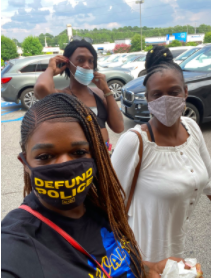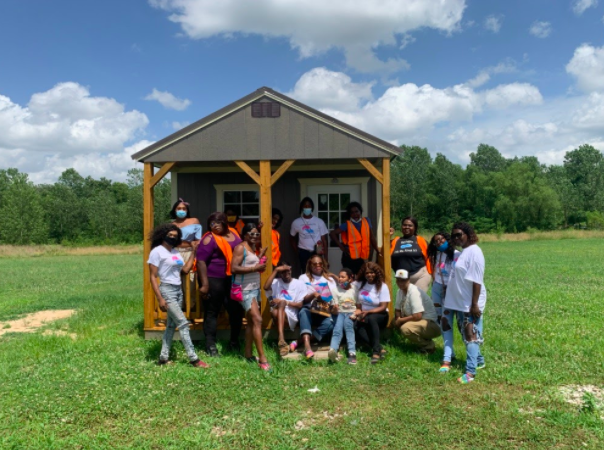Kayla Gore knows that many in the LGBTQ+ community, especially trans women of color, were being left out or purposely undermined when it came to housing. But as a healthcare worker for over five years, Gore understands that stable housing is the first step in wellness — so she decided to do something about it. In 2016, she and friend Ellyahnna C. Wattshall founded My Sistah’s House, a Memphis, Tennessee-based, transgender-led non-profit. The organization’s main mission is to provide housing, health services, and community to people aged 16 to 73 with a focus on transgender women of color. Now, COVID and Black Lives Matter protests have left many members displaced and homeless.
Enter the tiny home. My Sistah’s House is currently raising funds to build 20 tiny homes for LGBTQ+ people of color — with an emphasis on aiding transgender women. As executive director, Gore believes the creation of these small houses will be a long-term solution for the displacement many in the community are feeling. Earlier this summer, she organized a fundraiser campaign for $450,000 to build 20 tiny homes — part of an effort to establish security and independence for LGBTQ people of color. The organization purchased two separate pieces of land; these private properties will eventually be the location for the tiny homes and a consignment shop that will allow residents to buy and sell items as needed.
Gore sat down with GO to discuss her background in public health and advocacy and what we can do to help My Sistah’s House.
GO Magazine: How does your background shape the work you are doing with housing transgender folks?
Kayla Gore: Around eight or 10 years ago, I was transitioning and found myself homeless. I lived in shelters. I also lived outside. I know what homeless individuals experience because I have had that experience firsthand. I have been organizing around homeless issues for women, transgender folks, [and] femmes for about eight years now. I have also been working in public health for the past five years. Public health really ties into housing. All of the work that I have done has been in some way connected to the housing of LGBTQ people. … The co-founder of My Sistah’s House, Ellyahnna C. Wattshall, and I saw gaps where transgender adults were being left out of the housing conversation, [including] emergency housing [and] transitional housing. We started My Sistah’s House because [there was a housing need for] transgender adults, especially in emergency situations.

GO: What LGBTQ+ issues are the crux to your work?
KG: I’ve been [advocating for] about eight years now around housing issues, accessing health care, [and] the rollbacks and appeals of protections put in place by the Obama Administration. I’ve worked with a few different advocacy organizations throughout the South against bathroom bills. I’m currently in litigation with the current governor of Tennessee and the state of Tennessee [advocating for] rights to change our gender marker on our birth certificate.
GO: How did My Sistah’s House come to fruition?
KG: In 2016, it was completely grassroots. Ellyahnna C. Wattshall and I had stable housing and extra space, so we started letting people stay with us. [Eventually,] we started seeking funding. In 2017, we got our first grant [of] $2,500 from the Trans Justice Funding Project. We wanted to maximize what we had, so we thought of all the things that we could possibly do and one of the most important things we could have done was to provide name changes for folks who were coming to stay with us or that we had encountered. From that, we saw 10 people get their names legally changed. It just changed their whole trajectory of life; some of those individuals got on their feet a lot quicker than other folks who [didn’t] have the opportunity to change their name. In 2018, we bought a home, [became] incorporated, and got a fiscal sponsor so that we [could] increase our programming.
The goal was — and still is — for us to be recognized by the state as a halfway house for folks in prison [who] couldn’t apply for probation or parole. A lot of times with those programs, you have to have somewhere to come and stay before you are actually released. For a lot of transgender folks in Tennessee, especially a lot of transgender femmes and brown transgender femmes, there are no places that would [allow] them to be their authentic selves and not have to conform to gender norms. They have to complete their sentence. Cisgender folks who may have been convicted of the same crime get afforded the opportunity to get out early because there are places here that are established with the state and recognized as halfway houses. But in order to be recognized, you have to be a robust program. [We want] to be recognized by the state as a halfway house so that folks who are in prison have options to come home early.
GO: What is your greatest accomplishment with My Sistah’s House?
KG: I would have to say our Name Change Clinic [and] Training of the Trainers [program]. The clinic is where we walk folks through the process of changing their name and gender marker. With our clinic, we pay the fees associated with the name change, which can range anywhere from $200 to maybe $250 depending on the individual and classes of licenses. I think that would be one of our biggest things, and people gravitate to us for those services. The Training of the Trainer is where folks train other people to go through the [name changing] process legally.
Our housing is another thing [I’m proud of] because we’ve seen a lot of people pivot out of here into their own spaces.
GO: How has the coronavirus affected your services?
KG: It has affected our social support groups that we run here weekly, [however] we have been trying to mitigate going virtual. It’s easier on our end than it is for our members because a lot of our members don’t have access to the internet, Wi-Fi, or technology. It’s affected our street teams. We normally do street outreach, but we are not able to do that because of social distancing. People aren’t able to come over and hang out during the day. We aren’t able to have our monthly birthday celebration for folks here in our garden.
GO: My Sistah’s House is on track to build 20 tiny homes in the coming months. Where did this vision come from?
KG: The vision came amid the coronavirus [and] the Black uprising. Folks were being displaced who never experienced homelessness within our membership network. We stepped up to the plate and made sure that our folks were safe and secure. We [wondered] how we could be more proactive [if a] pandemic happened again. We [decided on] mortgage-free homeownership to provide folks housing security. One day, we posted a very ambitious GoFundMe. A few days later it was at $17,000, then $100,000, and then $200,000. To date, we’ve raised $300,000. We are working with Indianapolis-based architectural firm DKGR and Memphis-based builder TJ Builds to help us with representation and contractors.
GO: When do you expect the tiny homes to be completed?
KG: Ideally, we want to have phase one done by December. We are hoping we can do four homes in the first phase. We closed on two properties. Our architects want to make these homes unique and personable, so we are going to have a focus group [to discuss] the needs, wants, and desires of folks for their homes.

GO: In addition to homes, will there be shopping or additional services?
KG: So, initially [for] our first dream piece of land, we planned on having retreat space, a community garden, and the homes all on 30 acres right on the river, but it was in wetlands so that nixed that plan. However, we do have co-ops that already exist through My Sistah’s House. We have a shoe co-op where folks are able to sell shoes and make a profit. The shoes range anywhere from $15-$25. The shoes go in our survival kits as well, but for folks who need some type of financial stability, we try to offer that by [allowing them] to sell shoes. They make $5 off of each pair of shoes that they sell. We normally have booths at Pride and things like that for folks to sell them. We are in the plans to have a storefront. Rumors are that it’s supposed to be a consignment shop where we would sell shoes, gently used goods, and things like that.
GO: What do you hope will come out of building tiny homes for transgender people?
KG: Safety, security, a sense of value, and a sense of belonging. There is so much out there that says we do not belong. I think having homeownership creates an atmosphere of safety and autonomy over one’s self. One thing that I’ve learned is that we have to be able to create space in order for people to heal. I think with the creation of these tiny homes, people will have the space to actually heal. A lot of transgender folks in the South don’t have stable housing. [This] puts us in a mind-frame of living day to day, or by the week or by the month. We can’t plan for five years because we don’t necessarily know where we are going to be in a week, 72 hours, or three weeks. [There is power in] being able to say, “This is my space for the rest of my life. I can make plans beyond my next paycheck or my next meal because I have space to do whatever I need to do to heal.”

What Do You Think?